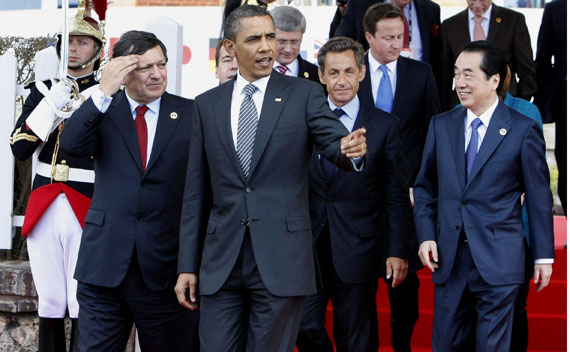“I’m Not Dead Yet”: Long Live the G8
More on:

In a review of the Deauville summit posted here on CFR.org, I argue that the Group of 8 Industrialized Nations (G8) retains a critical role in addressing the world’s most sensitive political challenges. The summit’s forceful Declaration on the Arab Spring, and its lengthy final communiqué, suggest that the G8 has enduring value as an embodiment of the collective values and interests of the West. Going forward, the United States and other G8 members should turn to the G8 to express normative solidarity and for a mechanism for generating effective multilateral action. The more diverse G20, though increasingly important, cannot yet be relied on to assume the G8’s functions.
Not everyone agrees. In a new brief from the Stanley Foundation, David Shorr outlines his view that the very logic for creating the G20—that solving the global financial crisis required cooperation between major emerging and established nations—applies equally to other daunting items on the global agenda. He envisions a steadily expanding G20 agenda to include an entire suite of politically sensitive issues, from stemming climate change to preventing mass atrocities, regulating the nuclear fuel cycle, promoting cybersecurity, and bringing peace to the Middle East. By implication, the G20 would quickly supersede the G8, which would presumably fade into obsolescence.
Shorr is not alone in considering the G8 an idea whose time has passed. Bruce Jones, Richard Gowan, and Emily O’Brien argue similarly in a report for the Brookings Institution prepared for the Deauville summit. Indeed, they contend that the very persistence of the G8 threatens to accelerate the world’s fragmentation into competing blocs—complicating collective efforts to address transnational challenges and provide global public goods. I’m not so sure. It’s not self-evident that the West’s decision to wind up the G8 would somehow persuade emerging powers to give up their own flexible coalitions of interest, whether the format is the India, Brazil, South Africa Dialogue Forum (IBSA), the Shanghai Cooperation Organisation (SCO), the Brazil, Russia, India, China, and South Africa (BRICS) group, or the Brazil, South Africa, India and China (BASIC) caucus.
Jones, Gowan, and O’Brien reject two common arguments for retaining the G8: as a hedge against the G20’s failure, and as a “useful political club for liberal Western democracies” (the latter an argument I made earlier this week). I’m less persuaded on both counts.
There is no reason for the United States, nor its other G8 partners, to put all their eggs in one basket, as I write in my summary of the Deauville summit. And some political issues are easier to discuss—and take decisive action on—within like-minded groupings of states. The Arab spring is a case in point.
The G20’s agenda will inevitably expand, including into matters of peace and security. But this should—and by necessity will—happen organically and gradually. In the meantime, the G8 will remain one of many important cooperative frameworks in a multi-multilateral world.
More on:
 Online Store
Online Store
